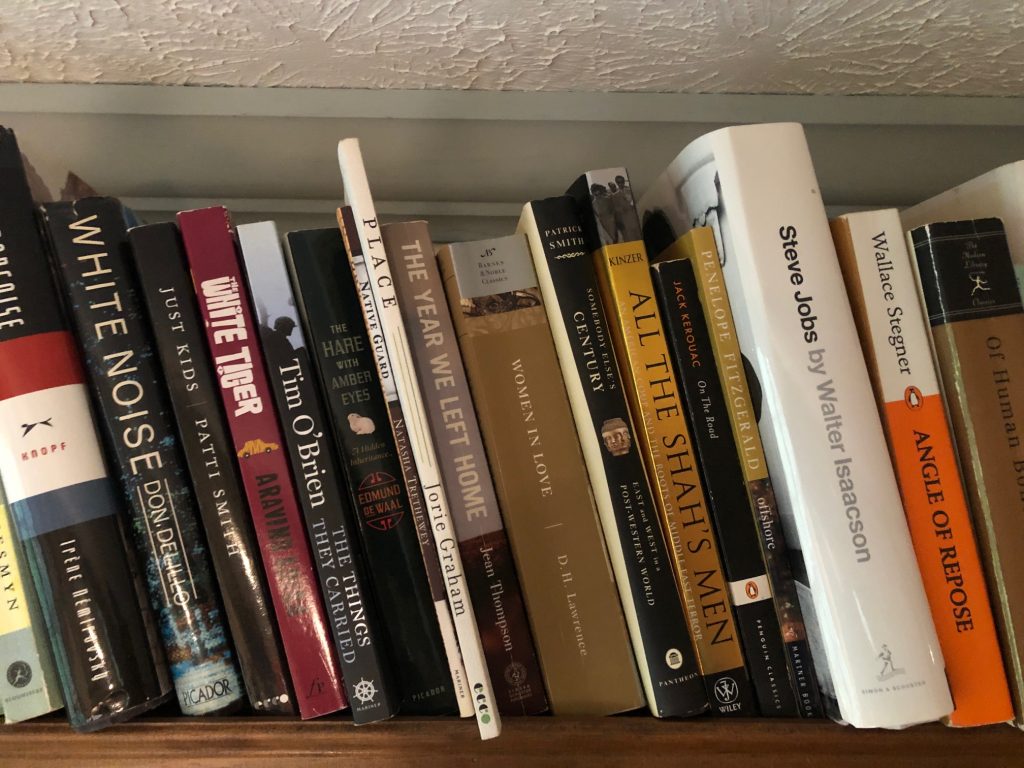Book Group
I always get a little nervous when it’s my month to pick the book. You’d think I would have gotten used to it. After all, the eight of us have been in our little book group for 13 years now. Whoever’s month it is gets to pick the next read. This time around I’ve assigned the least likely selection I would ever pick, the cyberpunk, sci-fi classic “Neuromancer” (1983) by William Gibson.
Having just finished reading it I know I have reason to be worried how they’ll react. It’s a very strange novel, virtually impossible to follow through a delineated plot line – a hybrid that merges the film “Matrix” with William Burroughs’ “Naked Lunch.”
At least I’ll be able to count on lively conversation about the book. And that all who attend will have read it. Among the many great things about our group is that we come prepared and stick to the topic. That’s been the most satisfying thing about the group – and the fact that we have basically held together, through the occasional illness, job loss and, lately, pandemic. We still meet eleven times a year, skipping only August. And folks show up on time, precisely at 7 PM, and stay around until 9:30 PM.

The sessions were more fun when we actually met in someone’s house. The rule, such as it is, has been that whoever picks the book hosts and provides the food and liquid refreshments. Ideally, the fare is themed to the book – such as the Indian food we had for Aravind Adiga’s novel, “The White Tiger.” For the last year we have had to make concessions to Zoom and meet that way, though with the same time commitment. Since almost all of us have now been fully vaccinated we’re making plans to reunite, though we have not been too specific as to when. The collective sense is that the group has been too valuable and too successful to let it fade away.
We didn’t all know each other equally well when we started. Some of us were friends; some had wives who were already in their own long-standing book group. Others knew someone whom they were comfortable recommending. The eight of us include (with overlap) two former academics, an educator, three lawyers, an engineer, an IT guy and a former insurance management fellow who really is a musician. Most of us seem to be politically progressive, or at least liberal, but we have managed to achieve enough of a balance that we are able to engage and take seriously each other rather than to pontificate. And we are not so respectful of a superficial decorum that we tolerate bullshit, if someone overdoes it.
I’m the only writer, but all of us are, or long had been, regular readers, and so it has been easy to get people to commit. The only rules we have are no books about sports, show up on time, be prepared, and there’s no arguing about the next month’s selection; we just rely on whoever is next up, alphabetically.
I have a nearly comprehensive list of the circa 150 books we’ve read in that time. It runs the gamut, from biographies of Robert Moses, Frederick Law Olmsted and J. Robert Oppenheimer (all of them my picks) to a ton of 20th century political and military affairs (broadly conceived, not the tactical kind) covering everything from both world wars to Vietnam, Iran, Iraq, the Holocaust and race relations. We’ve also read plenty of classic fiction: Franz Kafka, Virginia Woolf, Ernest Hemingway, F. Scott Fitzgerald, Vladimir Nabokov, John Cheever, Margaret Atwood, Philip Roth, Barbara Kingsolver and poet Natasha Trethewey.
We’ve had our dramatic moments, both good and bad. Saul Bellows’ “Herzog” split the group over who was more repulsive: the manically obsessive Moses Herzog or the writer who created him. By contrast, we were in consensus that D.H. Lawrence’s “Women in Love” read like laughable, adolescent fluff. Half way through the pandemic, our reading of Daniel Defoe’s “A Journal of the Plague Year” (1722) helped us appreciate certain recurring patterns in public health disasters. Among those books we admired the most were Per Petterson’s novel about Norwegian winters, “Out Stealing Horses” and a biography of early rock’ n roll impresario Sam Phillips.
My own anxieties about book selection stem from the icy reception that greeted my choice two years ago of Thorstein Veblen’s socio-economic classic from 1899, “The Theory of the Leisure Class.” There are times when, as a lapsed academic, I can overlook horrible writing and clumsy thinking, but the rest of the guys were not so accommodating.
Thirteen years now, we’ve been at this. Two original members left owing to job and life transitions. We seem to have come up with ideal successors through an idiosyncratic method that involves trust, word of mouth and an initial offer to attend – which, between the conversation and food, has proven irresistible.
It’s a monthly gathering we all look forward to, in large part because men our ages (50 and up) do not easily make friends or have a circle like this in which we can engage and explore without being judgmental in any sustained way. The conversations tend to be outer-directed, focusing on the book at hand, the context around it, or the political climate and issues of our times.
We’re not so good at opening up privately, whether it’s about domestic matters, illness, feelings or work. And that’s fine. This book group is where we feel comfortable for a few hours, sharing ideas and thoughts with people who, through the interaction, have become friends and intellectual neighbors. These days that goes a long way.

“Neuromancer” – excellent choice! My introduction to Gibson’s work was “Mona Lisa Overdrive”, after which I backtracked to “Neuromancer”. He is a master. (He is on Twitter as @GreatDismal.)